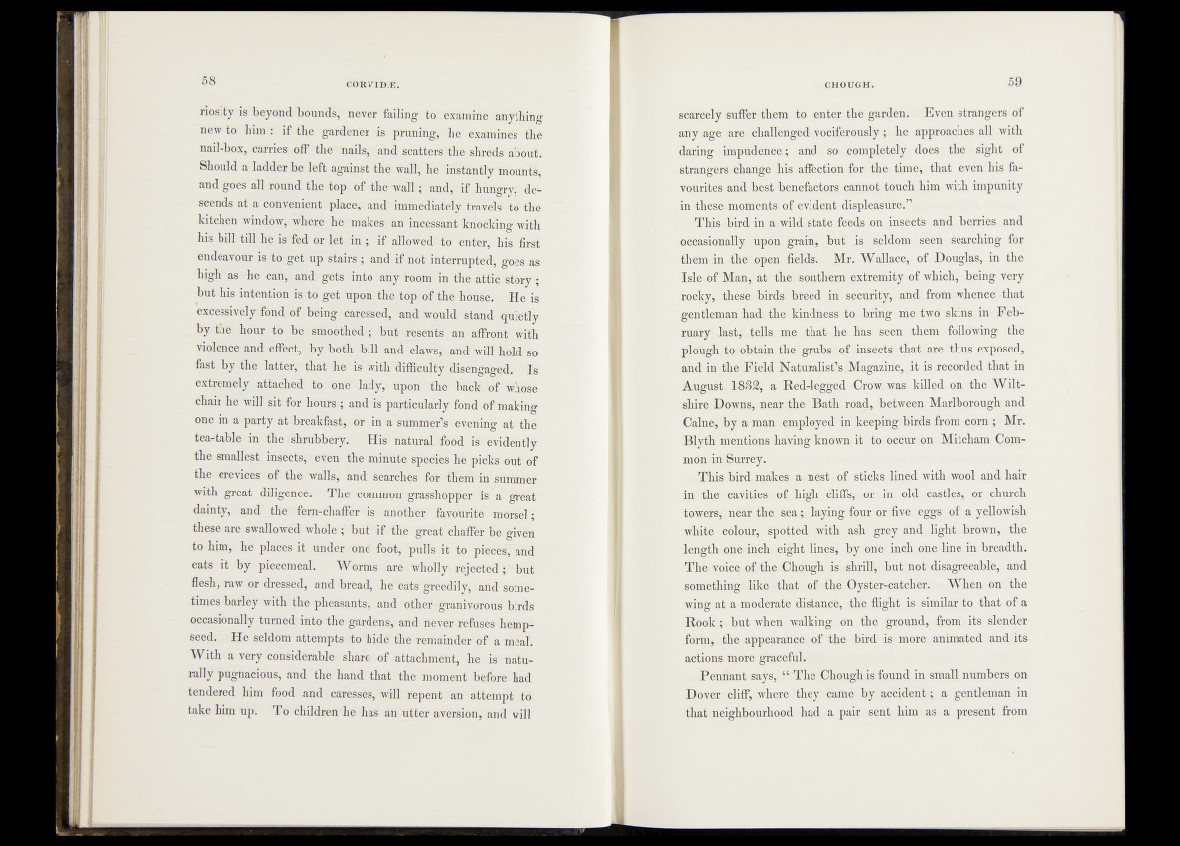
riosity is beyond bounds, never failing tolexamine anything
new to him : if the gardener is pruning, he examiiS the
nail-box, carries off the nails, and scatters the shreds about.
Should a ladder be left against the wall, he instantly mount!-,
and goes all round the top of te rw a ll; and, if hungry, descends
at a convenient place,, and immediately travelS-to; the
kitchen window, where he makes an incessant knocking with
his bill till he is fed or Let 'in ; if allowed' to- enter, his first
endeavour is to get -up stairs ; and if not interrupted*'goes as
high as he can, and gets into any room in the attic story;
but his intention is to get upon the top of th e house. HMs
excessively fond of being caressed* and would stand quietly
b y t e hour J o be smoothed; but, resents an affront with
violence and effect, by both bill and claws* .and will hold so
fast by the latter, that -he is with difficulty disengaged. Is
extremely attached to one lady,* upon -the back of whffg
chair he will sit for hours; and'is particularly fond ofmabrng
one in a party at breakfast* or in a summer’s evening a-t&the'
tea-table in the jshrubbery. His natural food iPtbvideh'tly^
the smallest .insects, even the minute species he picks‘out of
the crevices of- the walls, and searches for them- in^umnier
with great diligence. The common grasshopper is hi ghe&iT
dainty, and the fern-chaffer is another favourite 'morsel;
these are swallowed whole ;^butrif the great ehaffer be-giveu
to him, he places it under one foot, pulls it to piee^^and
eats it by piecemeal. Worms are wholly rejected"; but
flesh, raw or dressed, and bread, - heJats greedily, and some-
times barley with the pheasants, and other-granivorous birds
occasionally turned into the gardens, and hbvejt refuses hemp-
seed. He seldom attempts to hide the remainder of a meab
With a very considerable share of attachment, he is" naturally
pugnacious, and the hand that the moment before had
tendered him food and caresses, will repent an attempt to
take him up. To children he has an utter aversion, and will
scarcely suffer them:'to Center thé, garden. Even strangers of
any* age( are, challenged 'vociferously ; he approaches all with
daring tepudêneto; and Lsb completely does the sight of
stranff'ers;,ehanse his. afection foitthe tlmeÿ- th à t even his fa-
V,oolites and bÿst benefactor cannot touch him with impunity
in these; momS|sip%$p<|ent
This bird ipa^a wildi^ate. feeds =oji'4n<sects,v. and bejyies and
occasionally upon - g r a i n , t- seldom searching for
them in „ter open. field«-.; Mr. Waflace,r .^Douglas, in the
Isle of Man, at thebSouthem extremitpèf ^hielfl* being very
/rocky, these- birds dp’rÆd iik secp^ly^ agd from whenee that
gentleman had the kindness^tp bripg metw<$fkinsijin February
lasst^tejls mu. that he ,haé^e^Jhemhffollowing the
plough to pil^âtete grubs ■< of insects- that ate-; thus exposed,
and in the;Field Naturalist’s Magazine, it: is.recorded, that in
August 183$, a Bed-l,e^|s^dtïörowt was? M ll^ q n jh e Wiltshire
Downs, near the^Bathi^oad»,, ^ te e en . Marifrorough and
Caine, by amah Employed in keeping, birds from corn; ; Mr.
Blyth mentions, having known -it toioccb* on Mitcham' Com*
mon in-Surrey. ,
This bird, makes a n-.est> of sticks lined with wool and hair
in -the« cavitiesjpf high cliffs, or in hid. castles, or church
towersyinear the ? sea laying four or fivfe^eggg^.hÉ a yellowish
white colour, spotted with ash .grey and light brown, the
lengteone inch/eight lines;1 byigîjj^ inch one line-in breadth*
The voice ..of the Chough is ishrilllftbut' not-disagreeable, and
something like that thé Oyster-catcher*.! ; When-ton the
wing at a moderate distance, t¥é flight-is similar to that of a
Rook:;- but when- walking on the-ground, from its slender
form, the appearance of 'the bird is more animated and its
actions moifp graceful.
Pennant sàys*|É‘ The Chough is.found in small numbers on
Dover cliff, where they came.' bÿ accident; a gentleman in
that neighbourhood h ad . a pair sent him as a present from